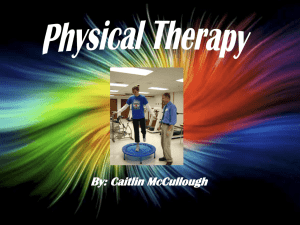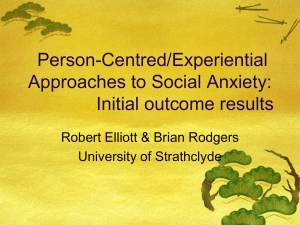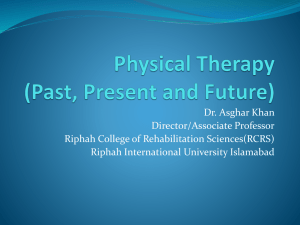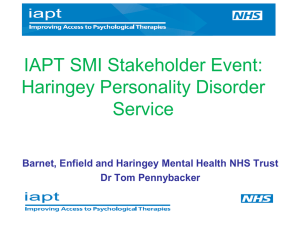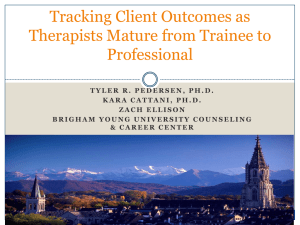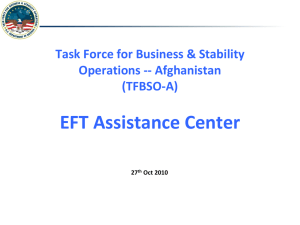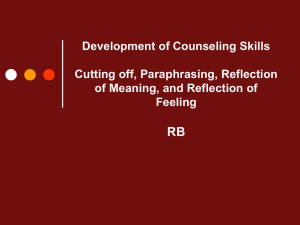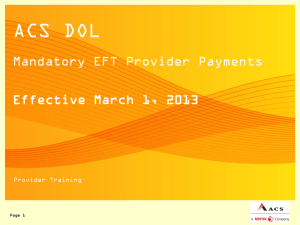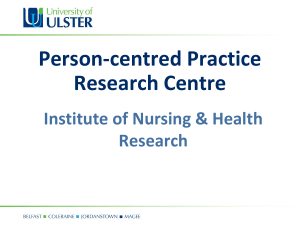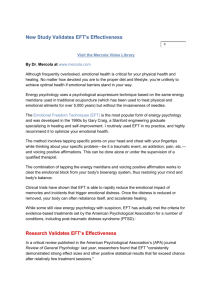Emotion-Focused Therapy and the Person-Centred
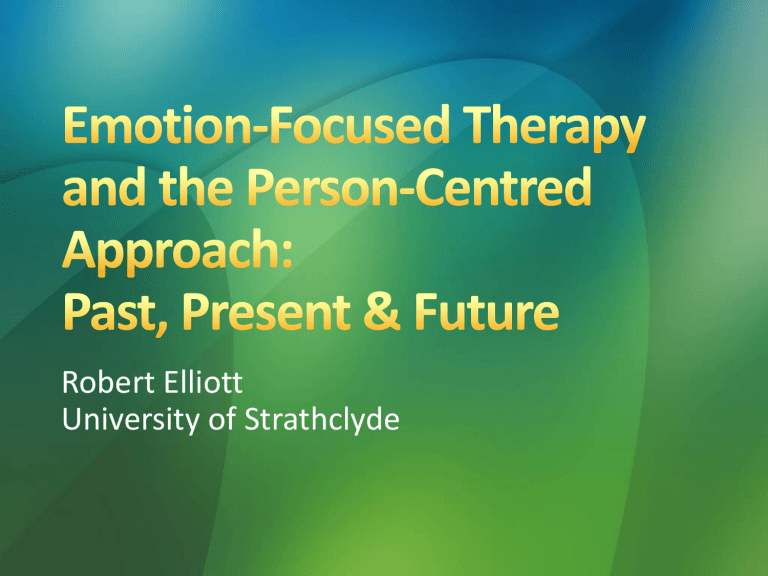
Robert Elliott
University of Strathclyde
Five years ago: Invited to join the Counselling
Unit
Walked into a place with a deep sense of culture and history built up over many years
But also, deeply counter-cultural
Complex web of:
Courses and projects
Relationships and traditions
Large team of talented trainers and counsellors
Highly committed students, past and present
Fear & trembling: Questions raised:
Would I be able to do meaningful work in this new setting?
Would I be accepted?
Is there space for my way of working with clients here?
Would I change it?
Would it change me?
What is the relationship between
Process-Experiential/Emotion-Focused Therapy
And the Person-Centred Approach?
In the early 1990’s, Barbara Brodley and John
Shlien had both said to me:
(Process)-Experiential therapy, Focusing, Emotion-
Focused Therapy ≠ Person-centred
But Laura Rice, Les Greenberg & I had all started from a Person-Centred base
Felt we were Person-Centred
So, coming here, I began…
With colleagues:
Classical/nondirective Person-Centred Therapy (PCT)
Broadly relational PCT
Pluralistic
My position has varied:
Curiosity & puzzlement
Awe & scepticism
Frustration & excitement
Will present what I’ve learned so far from this dialogue
Past, Present & Future
Roots/Sources: Humanism (The Renaissance,
The Enlightenment, existentialism, Third force
Humanistic psychology)
1940’s: Nondirective therapy: Rogers
1950’s: Classical approach: Chicago
Relationship conditions: unconditional positive regard, empathy, genuineness
1960’s: Focus on client process: Wisconsin
Late Rogers, Gendlin
The dialogue begins…
1970’s: Experiential therapy:
Gendlin: Focusing
Rice, Greenberg: task analysis
1980’s: Partial eclipse period
Dismissed in North America
Further development of PCA in Europe
1990’s: Beginning of PCE revival
Training centres established: Counselling Unit
Process-Experiential (PE)/Emotion-Focused
Therapy (EFT)
Explosion of research
2000’s:
World Association founded
Journal: Person-Centered and Experiential
Psychotherapies
Struggles for recognition
Research continues rapid development
EFT books & training emerge
Continuing dialogue between different parts of the tradition, especially from 1970 on
One end: “Classical” approaches
Emphasize Nondirectivity, Unconditional Positive Regard, the centrality of the relationship
Other end: Emotion-Focused Therapy
Emphasize client process, process guiding, the work of therapy
“Pluralistic Approach” fits in there somewhere…
Counselling Unit: One of few places in the world where it would have been possible to carry out this dialogue
Over an extended period of time
And with reference to actual practice
Most importantly, this has allowed exploration of the deeper issues of personal and professional identity:
Need to hang onto what is essential vs. need to escape oppressive restrictions
Need to establish self vs. feeling threatened or excluded
Which takes us to …
As a result of recent history of dialogue over our differences, can now ask:
Have PCT vs EFT differences been exaggerated?
Two recent efforts to look at this…
EFT jargon can put PCT therapists off
Makes it sound like EFT therapists are pulling levers and controlling clients
Have been trying to translate into PCT Friendly language
Many discussions with Beth Freire, Brian
Rodgers, Graham Westwell, and others
Example: The Six EFT Therapy Principles
Research Clinic therapists examined the 6 EFT principles.
Decided the following 3 need no translation:
1. Empathic Attunement: Always start by entering, attending to & tracking the client’s immediate experiencing
2. Therapeutic Bond: Offer genuine, empathic, caring presence to client
3. Self-development: Foster client growth, empowerment & choice
Involve different kinds of therapeutic work (=“tasks”)
4. “Task Collaboration”:
Listen for and engage with what client wants to work on
Offer orienting information about nature of therapy and particular ways of working in the session, particularly when the client asks or is puzzled
5. “Task Completion/Emotional Change”:
Listen for and engage with key issues clearly or repeatedly presented by client
Help client contact, explore and clarify core, growth-oriented emotions and views of self/others
Keep helping client work on their key issues until they feel they have resolved these or decide they want to stop
… and the client decides what is key, core, or resolved
6. “Process Guiding”:
Be aware of and respond helpfully to common kinds of client experiences and process
Eg, Empathic Refocusing response: allow C to step back from difficult emotions before offering opportunity to return to them
Respond to client-presented issues by offering opportunities for potentially useful kinds of therapeutic work
Always accept client’s decision about whether or not to accept a process offer
Freire, Elliott & Westwell, 2011
Developed quantitative process rating measure of PCE therapist adherence/competence
Person-Centred and Experiential Psychotherapy Scale
(PCEPS)
Two subscales:
Person-Centred (PC): 10 items
Eg Client frame of reference; content nondirectiveness
Experiential Process (Exp): 5 items
Eg Experiential specificity, emotion focus
1 – 6 descriptively-anchored scales
Passing = 3.5+
Just finished test of measure on 120 segments:
Research Clinic data
10-15 min segments
60 sessions, 20 clients, 10 therapists
5 student therapists (general client sample)
5 post-training therapists (clients with social anxiety)
2 PCT, 3 EFT (2 fully trained)
1. PCEPS is reliable (across items and raters)
2. In general, PC and Exp items correlate very highly with each other
3. We also found a Nondirectiveness factor
Empowering Presence, Content Nondirectiveness,
Clarity/brevity
4. Student therapists scored lower on all items
5. No difference between fully trained PCT and EFT therapists on: PC, Exp, and nondirectiveness subscales
Conclusion: Therapist and training effects much more important than PCT vs EFT differences
N Segments
Mean score
% “passing”
(at least
3.5)
Range
17% 0 – 33% Student therapists
PCT therapists
EFT therapists
EFT fully trained
60
24
36
24
3.1*
4.4
4.2
4.6
92%
75%
96%
83-100%
33-100%
92-100%
*P<.001 vs. SA protocol therapists (PCT + EFT); all other effects nonsignificant
PCT therapists
EFT therapists
EFT fully trained
PC
Scale:
Mean
PC
Scale:
% pass
Exp
Scale:
Mean
Exp
Scale:
% pass
NDir
Scale
Mean
Ndir
Scale % pass
4.5
92% 4.2
96% 4.6
87%
4.2
78% 4.2
75% 4.0* 72%
4.6
96% 4.7
96% 4.4
83%
*P<.01 vs. PCT therapists; all other effects nonsignificant
Where does this leave us?
Some concluding thoughts about avenues for continuing the dialogue
Provides an agenda for the future
Is it worth continuing to argue at an ideological level over nondirectivity and process guiding?
Like Psychology, we have been neglecting study of concrete behavior in favor of the ease of selfreport data
Both quantitative questionnaires & qualitative interviews
PCEPS study illustrates value of following the example of early Carl Rogers and colleagues
We need to return to the study of therapy process
Most of us are never going to be effective therapists across a range of different therapy approaches
But: We can do a better job of listening to and learning from each other within the PCE tradition:
Classical, nondirective therapists
Broadly relational person-centred therapists
Focusers and EFT therapists
Person-centred-based pluralistic experimenters in other approaches
Near neighbors in 4th generation CBT (eg Schema therapy) and contemporary relational psychodynamic therapy
Here in the Counselling Unit, I have found myself fascinated by rigorous nondirectivity in therapy
Personally, I could never adopt a sustained, rigorously nondirective stance
Nevertheless, it is clear to me that there are clients and moments when this is absolutely the best thing to do
I want to know:
What are these moments? (=client markers)
How can I maintain nondirectivity at these moments?
(=therapist processes)
What are the immediate and ongoing effects of these moments? (=micro-outcomes)
It’s so difficult to live in the middle:
Between dichotomies/unresolved differences/ ambiguity/ complexity
David Rennie’s “The rocky middle road”
However, I strongly suspect: Nondirectivity and Process
Guiding might actually need each other
Can be a source of moderation and creativity for each other
My dream for the next 20 years of the CU:
That as a community, we learn how to effectively live with and grow from from the creative tension between Nondirectivity and Process Guiding
Those questions I asked five years when I walked into this place…
About doing meaningful work, being accepted, finding space, changing things, and being changed…
The Answer is … Yes
Email: robert.elliott@strath.ac.uk
Blog: http://pe-eft.blogspot.com
